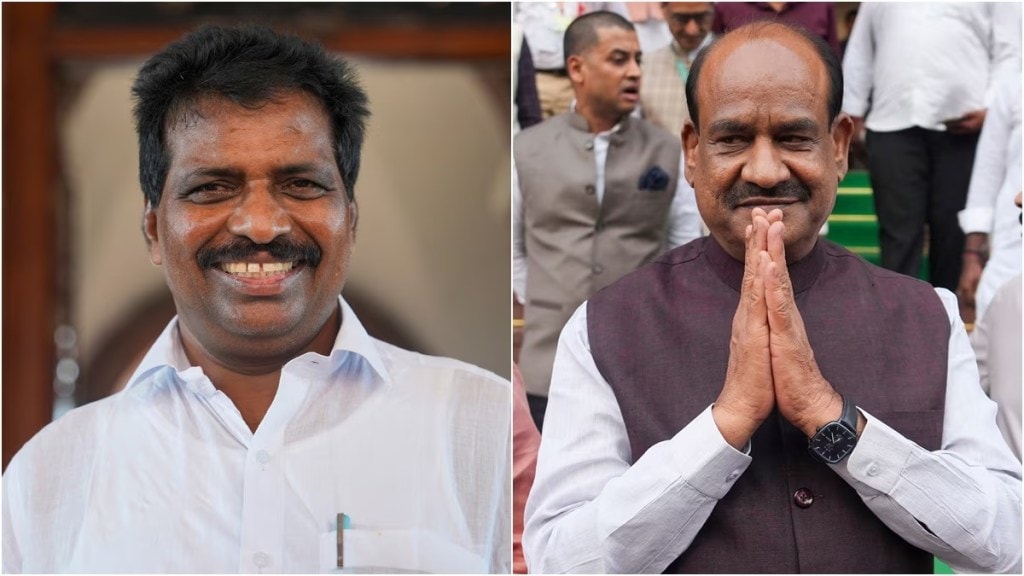After decades, Parliament is headed for an election for the Lok Sabha Speaker post with Prime Minister Narendra Modi set to move the motion when the House resumes today. Defence Minister Rajnath Singh will second the motion as the post will see an election for the first time since 1976.
The Lok Sabha Speaker’s post is being contested by two candidates, the National Democratic Alliance’s (NDA) pick, Om Birla, who was the Speaker in the 17th Lok Sabha, and eight-term MP from the Congress, K Suresh. The INDIA bloc decided to field K Suresh, a Dalit Congress leader and an eight-time MP from Mavelikkara in Kerala, after a consensus between them and the NDA collapsed.
Also Read: Lok Sabha Speaker election Live Updates
The decision to nominate a candidate by the Opposition came on Tuesday after high drama ensued as the Opposition initially agreed to support Om Birla and not field a candidate of its own, only to make a U-turn at the last minute. The move was a result of senior BJP leaders not agreeing to the Opposition’s precondition that they be offered the Deputy Speaker’s post.
This is, however, not the first instance that the Speaker’s post has seen a poll, with at least three previous occasions witnessing voting on the floor of the House, once in 1952, in 1967 and the most recent being in 1976.
Also Read: Parliament Session Live Updates
Let’s have a look at three instances where an election was held to elect the Speaker:
G V Malvankar vs Shankar Shantaram More in 1952
In 1952, Prime Minister Jawaharlal Nehru moved the motion for Malvankar, a prominent freedom fighter belonging to Gujarat and a former member of the Constituent Assembly, to be chosen as the Speaker. However, Cannanore MP A K Gopalan, a founder of the Communist movement in India and one of the 16 CPI MPs in the House, moved a motion in More’s favour.
Malvankar was elected as Speaker with 394 votes, while 55 MPs opposed his candidature.
Neelam Sanjiva Reddy vs Tenneti Viswanatham in 1967
The House was divided for the second time in 1967 when Indira Gandhi was the Prime Minister. The Lower House saw two motions – one in favour of Neelam Sanjiva Reddy of the Congress and another in favour of Tenneti Viswanatham, an Independent MP, whom the Opposition, including the CPI (M), supported.
It was argued that there should be a secret vote. Surendranath Dwivedy of the Praja Socialist Party said that a new precedent should be set and open voting should be done away with.
After debate, it was decided that the members would vote on paper slips. Printed slips with Ayes and Noes were given to the MPs, who then deposited the slips of their choice in secret. Neelam Sanjiva Reddy was elected the Speaker with 278 votes in his favour, while 207 members voted against him.
BR Bhagat vs Jagannathrao Joshi in 1976
In 1976, during the fifth session of the Parliament, which was extended by a year following the proclamation of Emergency in June 1975, a motion to choose BR Bhagat, a Congress MP, as the Speaker was moved by PM Indira Gandhi and was seconded by Parliamentary Affairs Minister Raghu Ramaiah. However, Bhavnagar MP PM Mehta (a member of the Congress O) moved a motion in Joshi’s favour. Joshi, a member of the Jana Sangh, was seconded by Hajipur MP D N Singh (Congress O).
Bhagat was subsequently elected Speaker with 344 votes in his favour and 58 voting against him.
